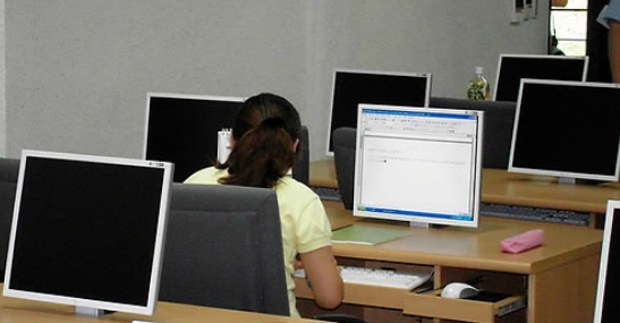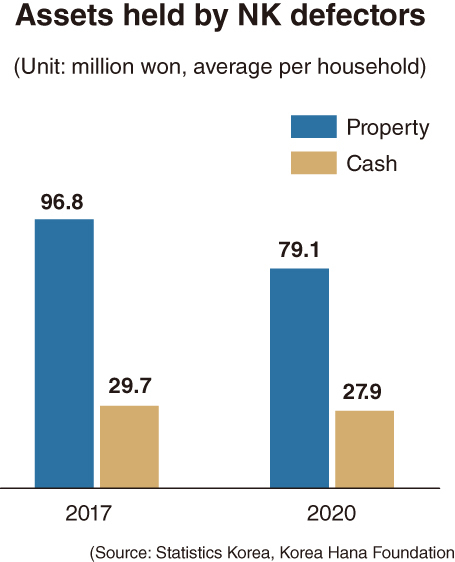[News Focus] Assets held by NK defectors shrink since 2017
Decline seen in real estate, cashable assets as of 2020
By Kim Yon-sePublished : Sept. 16, 2021 - 15:41

SEJONG -- Refugees from North Korea have seen their assets -- both real estate and cashable -- shrink in 2020, compared to 2017 when the nation started compiling the relevant data.
In particular, 7 in 10 households that include at least one refugee from North Korea, posted under 50 million won ($42,800) in real estate assets, data from state agencies showed.
According to the Korea Hana Foundation and Statistics Korea, property assets -- such as houses and land -- held by the North Korean defector families stood at 79.14 million won on average last year.
The analysis showed that 70.5 percent of the defector households were found to have owned property assets worth less than 50 million won. This indicates that the majority of defectors were not owning homes.
In particular, 7 in 10 households that include at least one refugee from North Korea, posted under 50 million won ($42,800) in real estate assets, data from state agencies showed.
According to the Korea Hana Foundation and Statistics Korea, property assets -- such as houses and land -- held by the North Korean defector families stood at 79.14 million won on average last year.
The analysis showed that 70.5 percent of the defector households were found to have owned property assets worth less than 50 million won. This indicates that the majority of defectors were not owning homes.

Only 6.8 percent of the refugee families owned houses or land worth 300 million won or over.
The findings showed 6.5 percent of defectors owned property worth between 200 to 300 million won, followed by 3.5 percent who had property valued at 150 to 200 million won. The next on the list were 5.5 percent with property of 100 million-150 million won, and 7.1 percent with property of 50 to 100 million won.
A noteworthy point is that their real estate assets has declined, compared to 2017 when it stood at 96.84 million won.
When it comes to the South-born nationals, their apartment prices in Seoul and some major regions shot up about 50-150 percent during the 2017-2020 period.
Last year, financial assets -- such as cash and stocks -- held by defector households recorded 27.98 million won on average.
Given that 80.5 percent of them posted less than 50 million won in cashable assets, a large portion of the households are likely to have been suffering from unemployment or debt.
Those whose financial assets were worth 300 million won or over accounted for only 0.9 percent, while the portion of those -- whose assets ranged between 50 million won and under 300 million won -- was 18.3 percent.
Likewise, their financial assets were found to have contracted by 1.8 million won in three years from the average of 29.78 million won in 2017.
Meanwhile, the outstanding debt held by defector households came to an all-time high of 72.06 million won on average in 2020, compared to 61.56 million won a year earlier. Compared to 2017, their debt surged by 58.1 percent.
Nearly 1 in 4 defectors, or 23.6 percent, were saddled with household debt worth 100 million won or over as of last year.
Those with debts ranging between 50 and 100 million won accounted for 15.3 percent, 27.4 percent had debt ranging between 20 and 50 million won.
North Korea refugees in their 20s saw their household debt grow 115 percent from 37.43 million won in 2017 to 80.79 million won in 2020. Those in their 30s posted a 70.3 percent increase to 78.53 million won.
Defectors have also struggled to find jobs. While South Korea has been posting quite low employment rates among the 37 members of the Organization for Economic Cooperation and Development, the figure goes further down when it comes to refugees.
The defectors posted a 54.4 percent employment rate in 2020, below the national average of 59.1 percent, Statistics Korea data showed.
Data suggests that those whose residing period in the South was less than three years were having difficulty finding jobs. The employment rate for those with three-year careers here stayed at 45 percent.
The findings showed 6.5 percent of defectors owned property worth between 200 to 300 million won, followed by 3.5 percent who had property valued at 150 to 200 million won. The next on the list were 5.5 percent with property of 100 million-150 million won, and 7.1 percent with property of 50 to 100 million won.
A noteworthy point is that their real estate assets has declined, compared to 2017 when it stood at 96.84 million won.
When it comes to the South-born nationals, their apartment prices in Seoul and some major regions shot up about 50-150 percent during the 2017-2020 period.
Last year, financial assets -- such as cash and stocks -- held by defector households recorded 27.98 million won on average.
Given that 80.5 percent of them posted less than 50 million won in cashable assets, a large portion of the households are likely to have been suffering from unemployment or debt.
Those whose financial assets were worth 300 million won or over accounted for only 0.9 percent, while the portion of those -- whose assets ranged between 50 million won and under 300 million won -- was 18.3 percent.
Likewise, their financial assets were found to have contracted by 1.8 million won in three years from the average of 29.78 million won in 2017.
Meanwhile, the outstanding debt held by defector households came to an all-time high of 72.06 million won on average in 2020, compared to 61.56 million won a year earlier. Compared to 2017, their debt surged by 58.1 percent.
Nearly 1 in 4 defectors, or 23.6 percent, were saddled with household debt worth 100 million won or over as of last year.
Those with debts ranging between 50 and 100 million won accounted for 15.3 percent, 27.4 percent had debt ranging between 20 and 50 million won.
North Korea refugees in their 20s saw their household debt grow 115 percent from 37.43 million won in 2017 to 80.79 million won in 2020. Those in their 30s posted a 70.3 percent increase to 78.53 million won.
Defectors have also struggled to find jobs. While South Korea has been posting quite low employment rates among the 37 members of the Organization for Economic Cooperation and Development, the figure goes further down when it comes to refugees.
The defectors posted a 54.4 percent employment rate in 2020, below the national average of 59.1 percent, Statistics Korea data showed.
Data suggests that those whose residing period in the South was less than three years were having difficulty finding jobs. The employment rate for those with three-year careers here stayed at 45 percent.








![[Graphic News] More Koreans say they plan long-distance trips this year](http://res.heraldm.com/phpwas/restmb_idxmake.php?idx=644&simg=/content/image/2024/04/17/20240417050828_0.gif&u=)
![[KH Explains] Hyundai's full hybrid edge to pay off amid slow transition to pure EVs](http://res.heraldm.com/phpwas/restmb_idxmake.php?idx=644&simg=/content/image/2024/04/18/20240418050645_0.jpg&u=20240419100350)







![[KH Explains] Hyundai's full hybrid edge to pay off amid slow transition to pure EVs](http://res.heraldm.com/phpwas/restmb_idxmake.php?idx=652&simg=/content/image/2024/04/18/20240418050645_0.jpg&u=20240419100350)

![[Today’s K-pop] Illit drops debut single remix](http://res.heraldm.com/phpwas/restmb_idxmake.php?idx=642&simg=/content/image/2024/04/19/20240419050612_0.jpg&u=)